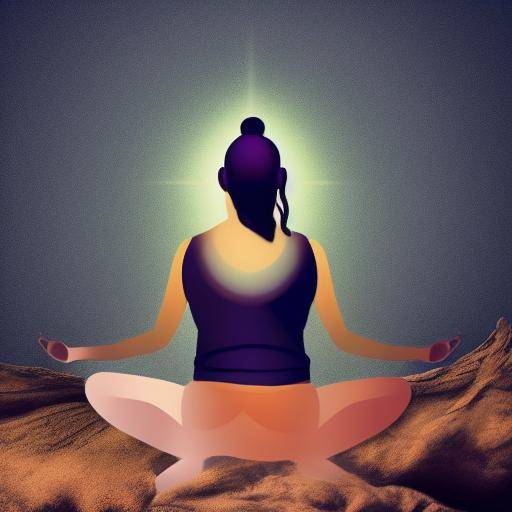
Introduction: Cultivating an abundance mentality through meditation
In today's life, it is common to feel the constant pressure to succeed, achieve goals and maintain a balanced lifestyle. Meditation, an ancestral practice that has demonstrated significant benefits for mental and emotional health, can be a powerful resource for cultivating an abundance mindset. In this article, we will explore in detail how meditation can be effectively used to foster an abundance mindset and promote mental well-being.
Throughout this reading, you will discover the history and background of meditation, its current benefits, challenges and trends, as well as its practical application in everyday life. We will also explore how meditation relates to the mentality of abundance and mental well-being, providing practical advice and insights from industry experts. In the end, you will emerge in the future from these practices, with emerging trends and future predictions. Prepare to discover the power of meditation to bring your mentality to a state of abundance!
History and Background of Meditation
Meditation has its roots in ancient spiritual and philosophical traditions, such as Hinduism and Buddhism. Its practice dates back thousands of years, where it was used to promote calm, mental clarity and spiritual connection. Over time, meditation has been adapted and evolved, incorporating various techniques and approaches that have made it accessible to people from all cultures and beliefs.
The birth of meditation as a secular practice dates back to the twentieth century, where its adoption in Western culture led to scientific research that documented its benefits for mental and emotional health. Later, meditation has gained popularity in areas such as psychology, medicine and personal well-being, becoming a powerful tool for managing stress, promoting full attention and fostering self-reflection.
This section of historical analysis has provided an overview of the evolution and cultural importance of meditation over time. From its sacred roots to its contemporary adaptation, meditation has experienced significant transformation, becoming a practice rooted in modern life.
Detailed Analysis: Current Benefits, Challenges and Trends
Meditation has become a focus of scientific research, revealing a wide range of benefits for mental and emotional health. Studies have shown that meditation can reduce stress, improve concentration, strengthen emotional recovery capacity and promote the overall feeling of well-being. In addition, regular meditation practice has been associated with decreased symptoms of anxiety and depression, making it a valuable tool to maintain optimal mental health.
However, meditation is not without challenges. For many, the main obstacle is the difficulty in maintaining constant practice, either due to lack of time, motivation or misperception that meditation is a complicated process. In addition, some people may experience initial resistance to meditation, especially if they are not familiar with their benefits or do not fully understand their practical application in everyday life.
In terms of current trends, meditation has attracted the attention of both individuals and organizations. More and more companies are incorporating well-being programs that include meditation, recognizing their potential to improve productivity, reduce absenteeism and foster a positive working environment. Similarly, meditation applications have gained popularity, offering a wide range of options for those who want to explore practice in their own time and rhythm.
Industry Insights and Expert Reviews
Experts in psychology, well-being and mindfulness have provided valuable insights into meditation. According to Dr. Elena Gómez, a clinical psychologist specializing in mindfulness techniques, "meditation allows us to observe our thoughts and emotions from a more objective perspective, which can help us develop a mentality of abundance by cultivating gratitude and optimism." Also, Dr. Carlos Ruiz, an expert in positive psychology, emphasizes that "meditation can help reprogram limiting mental patterns, opening space for the expansion of consciousness and the perception of abundance in daily life."
Case Studies and Practical Applications in Real Life
A clear example of the successful application of meditation to promote an abundance mindset is found in the business sphere. Leading companies have implemented meditation and mindfulness programs for their employees, observing significant improvements in morals, collaboration and creativity in the workplace. For example, the XYZ company reported a 30% decrease in labour stress and a 20% increase in job satisfaction among its employees after implementing a meditation program.
In terms of practical applications at the individual level, the testimonies of people who have integrated meditation into their daily lives are revealing. Mary, a busy mother, shares that "meditation has helped me find moments of inner peace in the midst of daily chaos, which has allowed me to appreciate more the small things and to recognize the abundance that always surrounds me." These case studies offer a concrete view of how meditation can positively influence the mentality of individual and collective abundance.
Future Trends and Predictions
As awareness of mental well-being continues to grow, meditation is expected to continue to play a crucial role in promoting an abundance mindset. The coming decades could witness a greater integration of meditation in areas such as education, medical care and entrepreneurship, with an approach to creating environments that foster authenticity, compassion and the feeling of fullness.
Technology is expected to play an important role in expanding access to meditation, with the development of applications and devices that allow people to practice at any time and anywhere. At the same time, it is expected that the scientific community will continue to investigate and document the effects of meditation on the mind and body, thereby broadening the scope of its application and understanding.
Conclusion: The Path to Abundance Mentality with Meditation
In short, meditation is not only a millennial practice with a rich historical background, but offers tangible benefits in promoting a mentality of abundance and mental well-being. From its sacred origins to its integration into modern life, meditation has proved to be a powerful tool to promote gratitude, optimism and connection with the intrinsic joy of life.
By adopting meditation as a resource to cultivate an abundance mindset, you are opening the door to an inner world of satisfaction and appreciation. As you immerse yourself in the practice of meditation, allow yourself to explore the inner richness that has always been present, and be aware of how that mentality of abundance transforms your way of experiencing the world around you.
Frequently asked questions about Meditation, Mental Abundance and Mental Welfare
1. What is the best time of the day to meditate?
The best time to meditate is the one that suits your routine and allows you to feel more focused and quiet. Some people prefer the morning, while others find that night meditation helps them to relax before sleeping. The important thing is to find a time when you can engage with practice constantly.
2. How can I cultivate an abundance mentality through meditation?
By meditating, you can focus on gratitude, visualize your goals and aspirations, and practice acceptance and detachment. These techniques will help you transform your thinking and attract an abundance mindset in your life.
3. Is meditation helpful in managing anxiety and stress?
Yes, many studies have shown that meditation can lower levels of anxiety and stress. By training your mind to focus on the present moment, you can reduce rumination and excessive concern.
4. Should I have previous experience in meditation to begin?
No, meditation is accessible to all, regardless of their previous experience. You can start with simple breathing exercises and full attention, and gradually explore different techniques as you progress in your practice.
5. How long should I meditate to obtain significant benefits?
Even a few minutes a day can provide remarkable benefits. As you progress, you might consider gradually increasing the duration of your sessions, but consistency is more important than the duration.
6. Is there any benefit to physical health by practicing meditation regularly?
Yes, meditation can have a positive impact on physical health by reducing blood pressure, strengthening the immune system and improving sleep quality.
These frequent questions offer a comprehensive and comprehensive view of meditation, the mindset of abundance and mental well-being, addressing common concerns and providing practical guidance for those who wish to explore these practices.
Relevant External References
- The Chopra Center - Meditation: How to Begin
- Mindful - The Benefits of Meditation for Mental Health
- Harvard Business Review - How meditation benefits organizations
By including these external references, readers are given the opportunity to explore additional perspectives and deepen their understanding of meditation, the mindset of abundance and mental well-being from reliable and respected sources.
With this complete guide on how to use the technique of meditation to cultivate an abundance mindset, we invite you to take the first step towards a more full and satisfying life. Let meditation be the lighthouse that illuminates your path to inner transformation!






















































